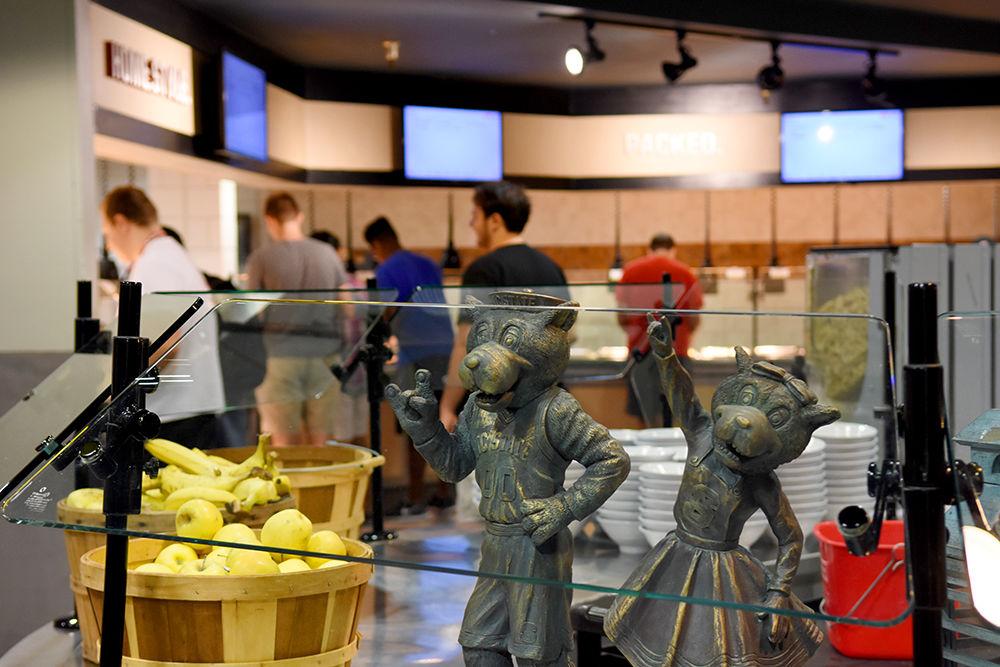University Dining has taken steps to improve food options to accommodate those with special dietary needs. New red-handle pans and spatulas, as well as a new nutrition icon, have been added to mark dishes that have touched or made with pork for students who maintain a halal diet. Additionally, Dining has implemented Menus of Change principles that tie health and sustainability together.
Halal, which means permissible in Arabic, is food that adheres to Islamic law, and as forbidden by the Quran, pork is not halal. After seeing students mark “halal” as an allergy or a special dietary need, Lisa Eberhart, Dining’s director of nutrition and wellness, decided to research and talk with other universities about what they were doing to address these concerns.
“During the summer, I met with the president of the Muslim Student Association about what they would like from Dining so that they could be more comfortable eating on campus,” Eberhart said. “My goal is for people with every type of nutritional or dietary need to be able to eat comfortably and safely on campus. I felt like we needed to be a lot more sensitive to their issues.”
The students from the Muslim Student Association requested food that contained pork be marked, a pork-free omelet pan at the omelet stations, and a separate pizza cutter to ensure no cross-contamination.
Starting last November, these requests were met with a magenta pig icon on menu boards to identify items with pork, and utensils and pans labeled with red markers to ensure no pork-contamination between dishes.
“By the end of this school year, I’m planning to mark anything that’s halal,” Eberhart said. “Halal is not just pork; it has to do with lots of different food items. There are certain halal meats that we purchase on campus. Most vegetarian items are halal, but there are some that aren’t.”
Eberhart and her team of advisors, made up of three students that follow a halal diet, are working to identify and purchase certified halal foods and eventually create a halal icon on Dining’s website by the fall semester.
In addition to the pork-free labeling, Dining has taken part in Menus of Change, an initiative from the Culinary Institute of America and Harvard T.H. Chan School of Public Health. The initiative is looking to improve the availability of healthy options and incorporate sustainable practices.
“It’s kind of a win-win because people often associate things that are sustainable with things that are healthy,” Eberhart said. “People equate those two things. We are very married, in Dining, to sustainability. Front and back of the house, we don’t have anything that’s not compostable. We’ve always done a lot of recycling. We’re way ahead of the curve in sustainability.”
Dining is currently working on eight principles of the Menus of Change initiative. These goals include sourcing and preparation transparency, plant-based culinary strategies, reduced portions, less red meat and a cut-back in sugary beverages.
“We want to give them the opportunity,” said Olivia Chadwick, an assistant to Eberhart and recent NC State graduate. “They don’t have to eat it, but we’re going to make sure that we give them the opportunity with all the healthy options.”
Students on campus are looking for these healthy changes to be made to the dining hall menus. Jessica Williams, a first-year studying engineering, is hoping that more grilled chicken will be available in substitute of the red meat.
“It’s good for people for people who want to go vegan,” Williams said. “I think they need that. But I think they also need healthy, good meat.”
Sarah Brown, a first-year studying life sciences, is a vegetarian who appreciates the variety of available options in restaurants and dining halls across campus, but is always looking for more accommodations.
“I really like when they have tofu,” Brown said. “They have a couple different tofu options, but I’d like to see it more often. During the winter, there’s been not as many vegetarian soups. I always want soup, but there’s only one kind that they ever have.”
David Dailey, a first-year studying life sciences, is a vegetarian who tried maintaining a vegan diet on campus. Dailey found that the nutrition labels and icons often helped him navigate the dining halls with his new diet.
“I went cold turkey, so I just completely stopped eating meat, and just went straight vegan,” Dailey said. “At first it was really hard transitioning because I didn’t really know what to eat, and so I would just eat a salad every day, and not really look at the other options that they had. My friend, who is vegan, actually got me to look and ask the people what’s vegan and what’s not and actually pay attention to the signs. It was actually really helpful, and I got to learn what to eat and how to get more vitamins.”
The Menus of Change principles align with vegan and vegetarian students, but also ensures there are options for meat eaters as well.
“It’s very much a trend for people to be flexitarian,” Eberhart said. “Sometimes they want to be vegetarian, sometimes they don’t. And we want to make sure that we have different options on campus, so they can try something out.”
Students crowd Clark Dining Hall on Monday to enjoy popular foods from native cultures in North America as part of Indigenous Peoples' Day. NC State was the first university in North Carolina to celebrate Indigenous Peoples' Day instead of Columbus Day in an effort to give the native community and culture increased recognition.









